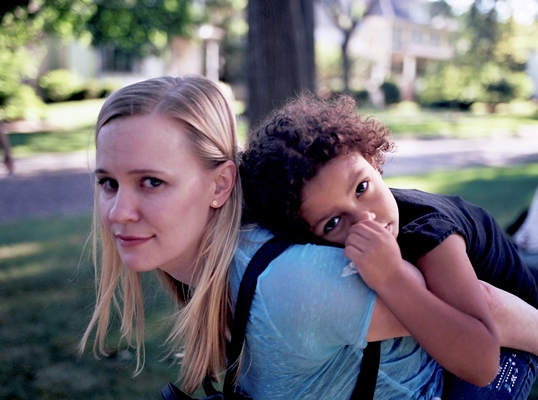
Alex Thompson’s feature debut Saint Frances might remind you of another Frances from several years back, Frances Ha’s Frances Halladay. Like that 2012 film, Saint Frances showcases the struggle of a woman who can’t break free of her youth or make the stride into adulthood either. Lacking Frances Ha’s cool black-and-white photography and competitive New York surroundings, Saint Frances manages to be more intimate, more poignant, and more irritating than its big-city sister, all the while airing growing-up dilemmas of its own.
At an underperforming, unfocused, and unhappy 34, waitress Bridget (Kelly O’Sullivan, the film’s screenwriter) desperately wants an upgrade from her dead-end job. The first night we meet her, Frances has a womanly accident that messes up the bed of a younger man she has picked up at a party. After their encounter, Frances terminates the resulting and unwanted pregnancy, and the film uses her constant, nagging bloodletting as a symbol of a lack of control over her life.
Bridget goes through her abortion as if it’s just another unwelcome rite of passage and acts as though the operation is no big deal, but emotions rumble around after the fact. Amid all the low-boiling angst, she manages to snag a gig as the nanny of a well-to-do suburban lesbian couple with a bright preschool child, the Frances of the title.
Saint Frances immediately takes a sunnier tone upon the entry of six-year-old Frances, played by Ramona Edith Williams in the key of totes adorable. Bridget’s encounters with Frances are so charming and sweet that they approach sitcom territory, or at least the crowd-pleasing realm of family comedy. Thornier are Bridget’s dealings with Frances’s parents, who are struggling to contain tensions in their relationship and need Bridget to pick up the slack at home more than she seems to understand.
A challenging element of the story lies in Bridget’s taking callow to a level that would give even Frances Halladay some pause. The young woman feels put-upon, but she is actually pretty lucky. People around her are remarkably tolerant of her tactless comments, her brusque responses to kindness, and her unforced (and sometimes dangerous) errors as a nanny.
Some of her blunders come off comic, even endearing; others may prompt older viewers to grouse under their breaths about the entitlement and cluelessness of the young. Screenwriter O’Sullivan shows a stronger hand with humor, apart from the central character, mixing some mild mockery of bourgeois households, precociously woke kids, and suburban NIMBY moms into her script.
A daring performance wrenches Saint Frances out of the realm of its heroine’s self-absorption, and not a moment too soon. Frances’s mother, Maya (an intense Charin Alvarez), reveals a hidden level of hurt and vulnerability that frighten Bridget and feel painfully real. At a personal crisis point, Maya needs support, and in offering it, Bridget finally steps into a role that makes her feel needed and worthy. The trade-off may seem a little pat, but also necessary, and the new connection helps Bridget understand some of her vulnerabilities.
Like its heroine, Saint Frances wants us to give it a break until it figures out where it’s going—a better place, in the end, than we expected. Frances Hallady could relate.






Leave A Comment